Tell us about yourself
My name is Katherine Reed, I’m 35, married to Tim and Mum to Will (7) and Harry (5). We all live on our family property in Rosevale, Tasmania. I grew up on the land, riding horses and generally running amok. My Mum is one of 12 kids, so we always had lots of cousins and family about. I love creating things, with decorating cakes being one of my favourite hobbies now, though my hobbies do change frequently! I have always been a reader, and could spend days reading, if life didn’t insist on getting in the way. I’m also a wheelchair basketball player, though retired from elite sport now.
What has been your journey of disability?
While I grew up with a brother with several intellectual and behavioural disabilities, my family’s experience of physical disability began when I was 19 and I had a fall off a horse, leaving me a complete paraplegic at the T4/5 level. As many people know, paraplegia means I use a wheelchair. The hidden aspects of paraplegia are the more frustrating ones on a day-to-day basis. The bladder and bowel incontinence are now mostly under control for me, using a combination of catheters, tablets, and suppositories in a strict routine, though things still do go wrong sometimes (and it was a big hit to the self-confidence early on as a 19-year-old!). I still struggle to keep my temperature regulated according to the temperature of the air around me. I get very cold in my lower half but will still feel hot if I’m moving around a lot. I also need to be mindful of ensuring I don’t get pressure sores and the constant battle of ensure I don’t exhaust myself… well, it’s exhausting!


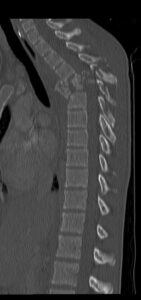
“The hidden aspects of paraplegia are the more frustrating ones on a day-to-day basis.”
What do you do with yourself?
I have spent the last 8 years at home looking after our family and home, but I’ve recently just gone back to work part-time, working both in schools (presenting wheelchair basketball clinics, spinal cord injury prevention talk and also talks on the Paralympics) and working to help get people with physical disabilities in Northern Tasmania into sport. I’ve had a big break from basketball, so I’m loving being able to play locally again, and to introduce the sport to others. And I’ve always loved the work in schools- it’s something I’ve done whenever the opportunity came up in the past and now it’s my job!
In between that, I am trying to contribute more to the farm too, both with the bookwork and with helping wherever I can (moving animals, getting the wood in etc.) as well as all the usual household/kids/family things.
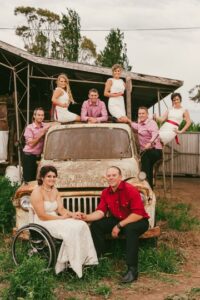
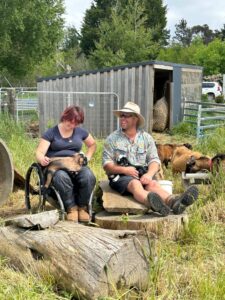
What are the unique challenges you face as a wheelchair user in a farm setting?
For me, one of the most difficult things I’ve found about being in a chair on the farm is just how useless I feel. I grew up on the land, so I’ve always been pretty hands on and competent. These days anything I do do is so clumsy and slow I really don’t feel like I’m helping at all. So, it’s left me feeling a bit lost on my own place. I certainly don’t feel like I can call myself a farmer. It’s a bit bittersweet really. But I could never bring myself to leave it.
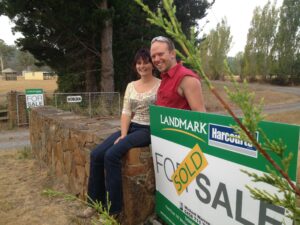
“I certainly don’t feel like I can call myself a farmer. It’s a bit bittersweet really. But I could never bring myself to leave it.”
How do you navigate/overcome these?
I keep trying. Tim has made a lot of changes to make things just a bit easier; the gates have been rehung to swing easily, he’s built me goat houses and paddocks near the house for my miniature goats and taps and electric fence switches are built with me in mind. He constantly pesters me to get outside and come do things with him. I keep one of my old wheelchairs up at the farm shed, so I have better access when I’m away from the house.
How has your journey as a woman and a wheelchair user in the farming industry been perceived by others you work with in the industry?
It’s been hit and miss. Overall, individual people are great. Industries and their one-size-fits-all rules have sucked. I wanted and tried desperately to remain in the racing industry after my accident, but I couldn’t make it work. I did a diploma in Horse Business Management at Marcus Oldham College in Geelong, and they were fantastic! I’m still the only student they’ve had in a chair, but I had the time of my life. They were so helpful, both supporting me to make accommodations where necessary and challenging me to get as much from the course as possible. I was still out there mucking out stables with the others at 6am before breakfast with everyone else.
“It’s been hit and miss. Overall, individual people are great. Industries and their one-size-fits-all rules have sucked.”
Are there things about you that people misunderstand because of your disability?
People often underestimate just how damn exhausting it is. I’m super-efficient on smooth, flat surfaces, but I’m still only using 30% of my muscles to carry around 100% of my body mass, (one that has increased over time, due to having children and just not being able to exercise in a way that will ever make certain parts of me look like they used to). The wheelchair is the easy part, as mentioned earlier.
Being able to get my own groceries does not make me extraordinary! I can do most things others can.
That this is the only way our family has known. Tim has only ever known me in my chair and our boys have never had an able-bodied mother. Yes, there are things we do differently, and some things I cannot do with them, but we adapt. I still helped them learn to ride a bike. The things they get to do instead though, make up for it. Will loves playing wheelchair basketball with me for example and he often comes to work with me
.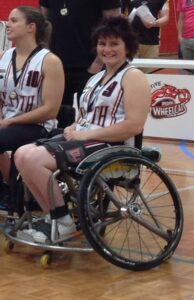
“Being able to get my own groceries does not make me extraordinary! I can do most things others can.”
What made you decide to start your Para Parenting and Para pregnancy blogs? And can you explain a bit about what your vision for these projects are?
I had been trying to research pregnancy and paraplegia basically since I had my accident and found almost nothing. A few ancient books and a couple of government websites that game me no real idea of what to expect, or what to talk to my doctors about. There is a Sean Dougherty quote: ‘Why bother? Because right now, there is someone out there with a wound in the exact shape of your words’. If I was going to fumble through this blind, I could at least make it easier for the next woman after me.
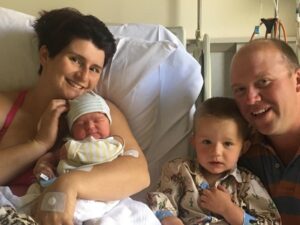
How have you found your sense of identity has changed?
I have really struggled with my identity of these past few years especially; I feel like I’ve completely lost any of my sense of self, so trying to work that out is the other thing I’m really trying to do now. Part of this is reconnecting with my friends and my creative side, both writing and making things. My life has just been a whirlwind of big events and adventures, so I’ve not had much of a chance to really work out who I am and what I really want to be and do, going forward. My accident was at an age when we form so much of our sense of self, and I was in survival mode. I threw myself into basketball, then a wedding and children… when the chaos of that settled down and I was at home full time with two small kids and a lot of time without other adults (especially as this was right when covid hit), I realised I had no idea what I liked anymore, what I wanted to do, who I wanted to be.
My diagnosis of ADHD two years ago has helped make sense of a lot of things about myself, but it has also involved me realising so many of my personality traits and ADHD symptoms and I’m not that special! I still have a lot of learning and re-learning to do about myself and being neurodivergent, and who I am beyond my ADHD.
Is there a single piece (or more!) of technology that makes your life easier? Why?
Other than my wheelchair and the hand controls in my car? I have a few things that really help me.
One is my quad bike, which gives me my freedom around the farm.
If they ever stop making Cliny HerCaths (my reusable catheters), I will be both pissed and devastated- they same me thousands of dollars a year in catheters, as well as amounts of landfill I cannot even begin to calculate! They can be difficult to source, but they are worth the effort. (I used them with Milton solution, which I change each night before bed).
Services like groceries to the boot make such a difference on the days when I’m bone tired too, although I was actually doing that way before it was on trend- I’ve collected a lot of phone numbers. As soon as I say I’m in a chair, most people are happy to bring stuff out to the car. The tap function on eftpos is also very helpful here!
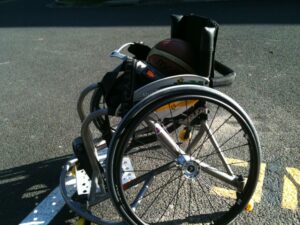
Knowing what you know now, what advice would you give your 18-year-old self?
My 19-year-old self, I would tell her; this is shit, its hard, but you will be ok. In fact, you will be able to say that this was a good thing. I know you’re not there yet, but that day is coming. You will mess up and hurt people along the way, but this is a huge thing, and you need to be kind to yourself too. Oh, and stops being such an areshole towards your Mum!! She’s the one who will be your biggest help though all of this and so much more to come.
My 18-year-old self, I would tell to do go try those things you’ve been thinking about, like white water rafting and mountain biking and have lots of (safe) sex! Shit is about to get real!!
Is there something that you would like people to know about you or about people with disabilities that they might not know?
Why is it that people seem to think we are some alien species? They don’t seem to realise how easily they could be in our shoes/wheelchairs. Or maybe they do, but the thought of it is just too… much. Seriously, we don’t bite (well unless you deserve it).
I do try to remind people that it’s really not cool to go ask a complete stranger intrusive medical questions, just because we have a disability. I’m someone who doesn’t mind too much having those conversations, if you bother to stop and (politely) connect with me, but I think I’m the exception to the rule. And you wouldn’t just walk up to an able-bodied person and ask them ‘what’s wrong’ with them, or ‘what happened to you?’ Nor would you ask them how they got pregnant, or if they can have sex.
“I do try to remind people that it’s really not cool to go ask a complete stranger intrusive medical questions, just because we have a disability“
Best advice that you would like to share with other women with disabilities?
Talk to other women, especially those with disabilities. I have met so many amazing women, with so many different disabilities through sport.
Boxing is a fun way to build up your strength and feel more confident in your personal safety- watch out anyone who sneaks up behind me!
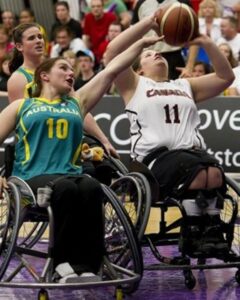
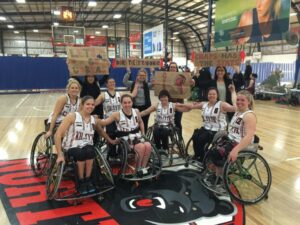
Do you have a way for people to connect or follow you that you would like me to share?
I can be found on Instagram at @paraparenting and my blog is www.parapregnancy.blogspot.com

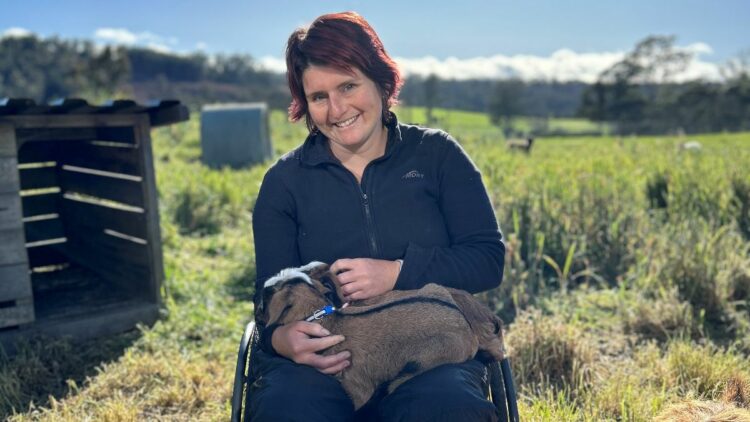
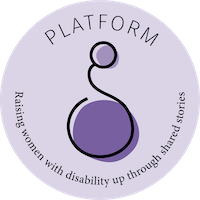

Hi Chris,
Greetings from sunny Kalbarri.!
Thank you ..another wonderful inspirational story.
Best wishes to you and your family too.
Deb 🌺
Best wishes to you to Deb.. thanks for reading and enjoying the stories!